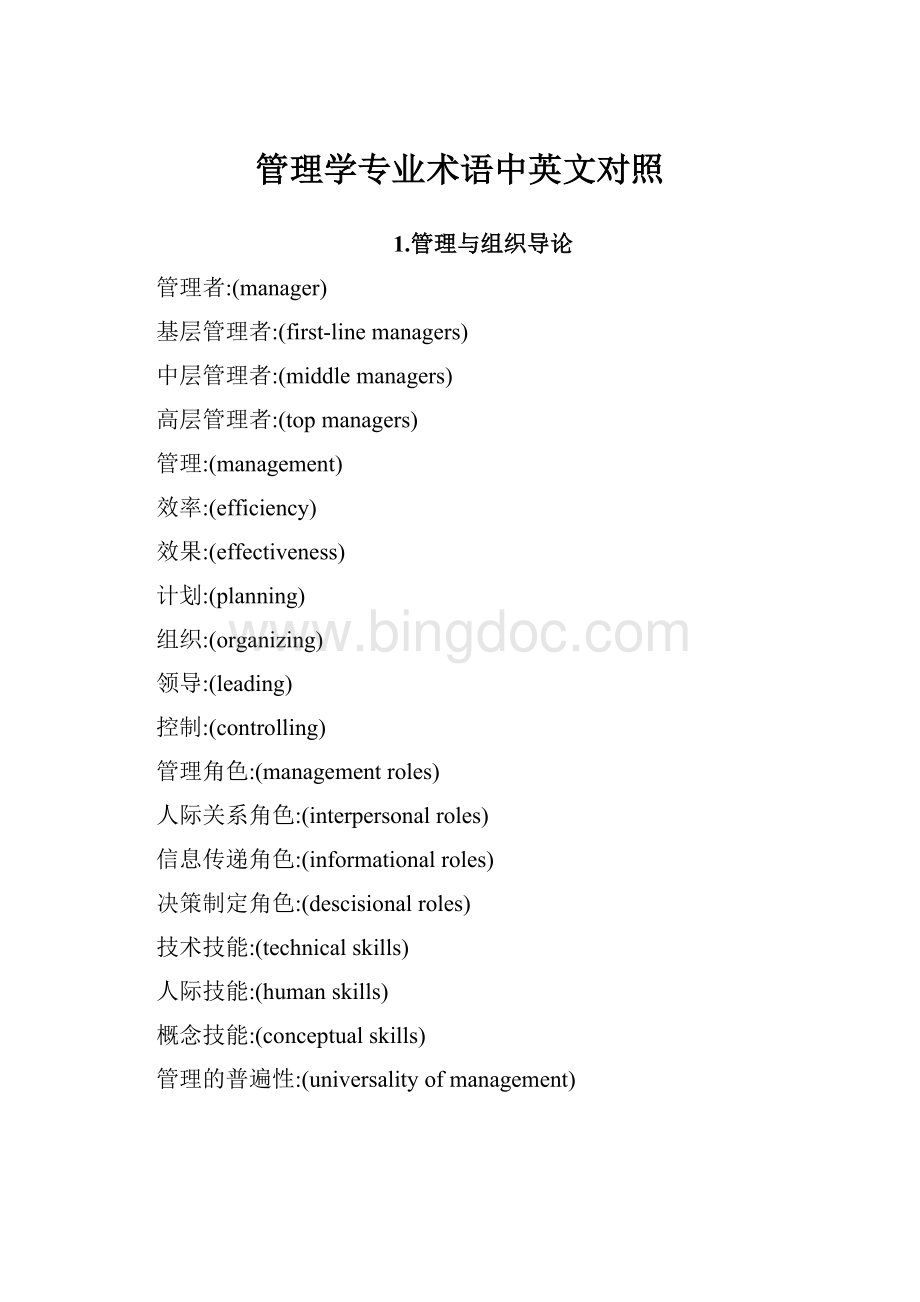管理学专业术语中英文对照.docx
《管理学专业术语中英文对照.docx》由会员分享,可在线阅读,更多相关《管理学专业术语中英文对照.docx(19页珍藏版)》请在冰点文库上搜索。

管理学专业术语中英文对照
1.管理与组织导论
管理者:
(manager)
基层管理者:
(first-linemanagers)
中层管理者:
(middlemanagers)
高层管理者:
(topmanagers)
管理:
(management)
效率:
(efficiency)
效果:
(effectiveness)
计划:
(planning)
组织:
(organizing)
领导:
(leading)
控制:
(controlling)
管理角色:
(managementroles)
人际关系角色:
(interpersonalroles)
信息传递角色:
(informationalroles)
决策制定角色:
(descisionalroles)
技术技能:
(technicalskills)
人际技能:
(humanskills)
概念技能:
(conceptualskills)
管理的普遍性:
(universalityofmanagement)
2.管理的历史
劳动分工:
(divisionoflabor)
工作专业化:
(jobspecialization)
工业革命:
(industrificrevolution)
科学管理:
(scientificmanagement)
一般行政管理理论:
(generaladministrativetheory)
管理原则:
(principlesofmanagement)
官僚行政组织:
(bureaucracy)
定量方法:
(quantitativeapproach)
组织行为:
(organizationalbehavior)
霍桑研究系统:
(Hawthornestudiessystems)
封闭系统:
(closedsystems)
开放系统:
(opensystems)
权变理论:
(contingencyapproach)
劳动力多元化:
(workforcediversity)
电子企业:
(e-business)
电子商务:
(e-commerce)
内部网:
(intranet)
学习型组织:
(learningorganization)
知识管理:
(knowledgemanagement)
质量管理:
(qualitymanagement)
3.组织文化与环境
管理万能论:
(omnipotentviewofmanagement)
管理象征论:
(symbolilviewofmanagement)
组织文化:
(organizationculture)
强文化:
(strongcultures)
社会化:
(socialization)
工作场所精神境界:
(workplacespirituality)
外部环境:
(externalenvironment)
具体环境:
(specificenvironment)
一般环境:
(generalenvironment)
环境的不确定性:
(environmentuncertainty)
环境的复杂性:
(environmentcomplexity)
利益相关群体:
(stakholders)
4.全球环境中的管理
狭隘主义:
(parochialism)
民族中心论:
(ethnocentricattitude)
多国中心论:
(polycentricattitude)
全球中心论:
(geocentricattitude)
跨国公司:
(multinationalcorporation)
多国公司:
(multidomesticcorporation)
全球公司:
(globalcompany)
跨国或无边界组织:
(transnationalorboredrlessorganization)
初始全球化组织:
(bornglobals)
全球外购:
(globalsourcing)
出口:
(exporting)
进口:
(importing)
许可证经营:
(licensing)
许可经营:
(franchising)
战略同盟:
(strategicalliance)
合资企业:
(jointventure)
外国子公司:
(foreignsubsidiary)
市场经济:
(marketeconomy)
计划经济:
(commandeconomy)
民族文化:
(nationalculture)
5.社会责任与管理道德
古典观点:
(classicalview)
社会经济学观点:
(socioeconomicview)
社会义务:
(socialobligation)
社会响应:
(socialresponsiveness)
社会责任:
(socialresponsinility)
社会屏障筛选:
(socialscreening)
管理的绿色化:
(gerrningofmanagement)
以价值观为基础的管理:
(values-basedmanagement)
道德:
(ethics)
自我强度控制点:
(egostrengthlocusofcontrol)
道德准则:
(codeofethics)
社会企业家:
(socialentrepreneur)
社会影响管理:
(socialimpactmanagement)
6.制定决策
决策:
(decisions)
决策制定过程:
(decision-makingprocess)
决策标准问题:
(decisioncriteriaproblem)
理性的:
(rational)
有限理性:
(boundedrationality)
满意的承诺升级:
(satisfiedescalationofcommitment)
直觉决策:
(intuitivedecisionmaking)
结构良好问题:
(structuredproblems)
程序化决策:
(programmeddecision)
程序:
(procedure)
规则:
(rule)
政策:
(policy)
结构不良问题:
(unstructuredproblems)
非程序化决策:
(nonprogrammeddecisions)
确定性:
(certainty)
风险性:
(risk)
命令型风格:
(directivestyle)
分析型风格:
(analyticstyle)
概念型风格:
(conceptualstyle)
行为型风格:
(behavioralstyle)
启发法:
(heuristics)
7.计划的基础
陈述目标:
(statedgoals)
真实目标:
(realgoals)
战略计划:
(strategicplans)
运营计划:
(operationalplans)
长期计划:
(long-termplans)
短期计划:
(short-termplans)
具体计划:
(specificplans)
方向性计划:
(directionalplans)
一次性计划:
(single-usedplans)
持续性计划:
(standingplans)
传统目标:
(traditionalgoalsetting)
手段-目标链:
(means-endschain)
目标管理:
(managementbyobjectives)
使命:
(mission)
承诺概念:
(commitmentconcept)
正式计划部门:
(formalplanningdepartment)
8.战略管理
战略管理:
(strategicmanagement)
组织战略商业模式:
(strategiesbusinessmodel)
战略管理过程:
(strategicmanagementprocess)
机会:
(opportunities)
威胁:
(threats)
资源:
(resources)
能力:
(capabilities)
核心竞争力:
(corecompetencies)
SWOT分析法:
(SWOTanalysis)
公司层战略:
(corporatestrategy)
增长战略:
(growthstrategy)
相关多元化:
(relateddiversification)
非相关多元化:
(unrelateddiversification)
稳定性战略:
(stabilitystrategy)
更新战略:
(renewalstrategies)
紧缩战略:
(retrenchmentstrategy)
扭转战略:
(turnaroundstrategy)
BCG矩阵:
(BCGmatrix)
业务层战略:
(businessstrategy)
战略业务单元:
(strategicbusinessunits)
竞争优势:
(competitiveadvantage)
成本领先战略:
(costleadershipstrategy)
遵循差异化战略:
(differentiationstrategy)
聚焦战略:
(focusstrategy)
徘徊其间:
(stuckinthemiddle)
战略灵活性:
(strategicflexibility)
市场先入者:
(firstmover)
9.计划的工具技术
环境扫描:
(environmentscanning)
竞争对手情报:
(competitorintelligence)
预测:
(forecasts)
定量预测:
(quantitativeforecasting)
定性预测:
(qualitativeforecasting)
标杆比较:
(benchmarking)
资源:
(resources)
预算:
(budget)
甘特图:
(Ganttchart)
负荷图:
(loadchart)
事件:
(events)
计划评审技术:
(theprogramevaluationandreviewtechnique)
活动:
(activities)
松弛时间:
(slacktime)
关键路径:
(criticalpath)
盈亏平衡分析:
(breakevenanalysis)
线性规划:
(linearprogramming)
项目管理:
(projectmanagement)
脚本:
(scenario)
10.组织结构与设计
组织结构设计:
(organazationalstructuredesign)
工作专门化:
(workspecialization)
职能部门化:
(functionaldepartmentalization)
产品部门化:
(productdepartmentalization)
地区部门化:
(geographicaldepartmentalization)
过程部门化:
(processdepartmentalization)
顾客部门化:
(customerdepartmentalization)
跨职能团队:
(cross-functionalteams)
指挥链:
(chainofcommand)
职权:
(authority)
职责:
(responsibility)
统一指挥:
(unityofcommand)
管理跨度:
(spanofcontrol)
集权化:
(centralization)
分权化:
(decentralization)
员工授权:
(employeeempowerment)
正规化:
(formalization)
机械式组织:
(mechanisticorganization)
有机式组织:
(organicorganization)
单件生产:
(unitproduction)
大批量生产:
(massproduction)
连续生产:
(processproduction)
简单结构:
(simplestructure)
职能型结构:
(flanctionalstructure)
事业部型结构:
(divisionalstructure)
团队结构:
(teamstructure)
矩阵型结构:
(matrixstructure)
项目型结构:
(projectstructure)
无边界组织:
(boundarylessorganization)
虚拟组织:
(virtualorganization)
学习型组织:
(learningorganization)
组织结构图:
(organizationalcharts)
11.沟通与信息技术
沟通:
(communication)
人际沟通:
(interpersonalcommunication)
组织沟通:
(organizationalcommunication)
信息:
(message)
编码:
(encoding)
解码:
(decoding)
沟通过程:
(communicationprocess)
噪声:
(noise)
非语言沟通:
(nonverbalcommunication)
体态语言:
(bodylanguage)
语调:
(verbalintonation)
过滤:
(filtering)
信息超载:
(informationoverload)
积极倾听:
(activelistening)
正式沟通:
(formalcommunication)
非正式沟通:
(informalcommunication)
下行沟通:
(upwardcommunication)
横向沟通:
(lateralcommunication)
斜向沟通:
(diagonalcommunication)
沟通网络:
(communicationnetworks)
小道消息:
(grape-vine)
电子邮件:
(e-mail)
即时消息:
(instantmessaging)
音频邮件:
(voice-mail)
电子数据交换:
(electrinicdatainterchange)
电话会议:
(teleconferencing)
可视会议:
(videoconferencing)
网络会议:
(webconferencing)
内部互联网:
(intranet)
外部互联网:
(Extranet)
实践社区:
(communitiespractive)
12.人力资源管理
高绩效工作实务:
(high-performanceworkpractices)
人力资源管理过程:
(humanresourcemanagementprocess)
工会(laborunion)
反优先雇佣行动计划:
(affirmativeaction)
人力资源规划:
(humanresourceplanning)
职务分析:
(jobanalysis)
职务说明书:
(jobdescription)
职务规范:
(jobspecification)
招聘:
(recruitment)
解聘:
(decriuitment)
甄选:
(selection)
效度:
(validity)
信度:
(reliability)
工作抽样:
(worksamping)
评估中心:
(assessmentcenters)
真实工作预览:
(relisticjobpreview)
上岗培训:
(orientation)
绩效管理系统:
(performancemanagementsystem)
书面描述法:
(writtenessay)
关键事件法:
(criticalincidents)
评分表法:
(graphicratingscales)
行为定位评分法:
(behaviorallyanchoredratingscales)
多人比较法:
(multipersoncomparisons)
360度反馈法:
(360-degreefeedback)
基于技能薪酬:
(skill-basedpay)
浮动工资:
(variablepay)
精简机构:
(downsizing)
性骚扰:
(sexualharassment)
基于家庭的福利:
(family-friendlybenefits)
13.变革与创新管理
组织变革:
(organizationalchange)
变革推动者:
(changeagent)
组织发展:
(organizationaldevelopment)
压力:
(stress)
14.行为的基础
行为:
(behavior)
组织行为学:
(organizationalbehavior)
员工生产率:
(employeeproductivity)
离职率:
(turnover)
组织公民行为:
(organizationalcitizenbehavior)
工作满意度:
(jobsatisfaction)
工作场所不当行为态度:
(workplacemisbehaviorattitudes)
认知行为:
(cognitivecomponent)
情感成分:
(affectivecomponent)
行为成分:
(behaviorcomponent)
组织承诺:
(organizationalcommitment)
组织支持感:
(perceivedorganizationalsupport)
认知失调:
(cognitivedissonance)
态度调查:
(attitudesurveys)
人格:
(personality)
马基雅维里主义:
(machiavellianism)
自尊:
(self-esteem)
自我控制:
(self-monitoring)
印象管理:
(impressionmanagement)
情绪:
(emotion)
情绪智力:
(emotionalIntelligence)
知觉:
(perception)
归因理论:
(attributiontheory)
基本归因错误:
(fundamentalattributionerror)
自我服务偏见:
(self-servingbias)
假设相似性:
(assumedsimilarity)
刻板印象:
(stereotyping)
晕轮效应:
(haloeffect)
操作性条件反射:
(operantconditioning)
社会学习理论:
(sociallearningtheory)
行为塑造:
(shapingbehavior)
15.理解群体与团队
群体:
(group)
形成阶段:
(forming)
震荡阶段:
(storming)
规范阶段:
(norming)
执行阶段:
(performing)
解体阶段:
(adjourning)
群体思维:
(groupthink)
地位:
(status)
社会惰化:
(socialloafing)
群体内聚力:
(groupcohesiveness)
冲突:
(conflict)
冲突的传统观点:
(traditionalviewofconflict)
冲突的人际关系观点:
(humanrelationsviewofconflict)
冲突的交互作用观点:
(interactionistviewofconflict)
积极冲突:
(functionalconflict)
消极冲突:
(disfunctionalconflict)
任务冲突:
(taskconflict)
关系冲突:
(relationshipconflict)
过程冲突:
(processconflict)
工作团队:
(workteams)
自我管理团队:
(self-managedworkteams)
跨职能团队:
(cross-functionalteam)
虚拟团队:
(virtualteam)
社会网络构造:
(socialnetworkstructure)
16.激励员工
动机:
(motivation)
需要层次理论:
(hierarchyofneedstheory)
双因素理论:
(two-factortheory)
保健因素:
(hygienefactors)
激励因素:
(motivators)
三种需要理论:
(three-needstheory)
成就需要:
(needforachievement)
权力需要:
(needforpower)
归属需要:
(needforaffiliation)
目标设置理论:
(goal-settingtheory)
自我效能感:
(self-efficacy)
强化理论:
(reinforcementtheory)
强化物:
(reinforcer)
工作设计:
(jobdesign)
工作扩大化:
(jobenlargement)
工作丰富化:
(jobenrichment)
工作深度:
(jobdepth)
工作特征模型:
(jobcharacteristicsmodel)
公平理论:
(equitytheory)
参照对象:
(referents)
分配公平:
(distributivejustice)
程序公平:
(proceduraljustice)
期望理论:
(expectancytheory)
压缩工作周:
(compressedworkweek)
弹性工作制:
(flexibleworkhours)
弹性时间制:
(flextime)
工作分担:
(jobsharing)
远程办公:
(telecommuting)
账目公开管理:
(open-bookmanagement)
员工认可方案:
(employeerecognitionprograms)
绩效工资方案:
(pay-for-performanceprogram)
股票期权:
(stockoptions)
17.领导
领导者:
(leader)
领导:
(leadership)
行为理论:
(behavioraltheories)
独裁型风格:
(authoeraticstyle)
民主型风格:
(democraticstyle)
放任型风格:
(laissez-fairestyle)
定规维度:
(initiatingstrueture)
关怀维度:
(consideration)
高-高型领导者:
(high-highleader)
管理方格:
(managerialgrid)
权变模型:
(contingencymodel)
最难共事着问卷:
(least-preferredco-workerquestionnaire)
情境领导理论:
(situationalleadershiptheory)
成熟度:
(readiness)
领导者参与模型:
(leaderparticipationmodel)
路径-目标理论:
(path-goaltheory)
交易型领导者:
(transactionalleaders)
变革型领导者:
(transformationalleaders)
领袖魅力型领导者:
(charismaticleader)
愿景规划型领导:
(vis